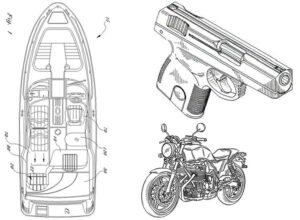Patent Applications
Patents
Our passion is helping manufacturers, researchers, corporations, and entrepreneurs prepare and secure patents. Discounts may be available for repeating or bulk work. We would be happy to discuss your patent application needs in whatever technical art you deal with. Examples of work patents and basic information about patent applications we handle follows. Please select from the menu below for more information about patent topics.
FEES: * Please contact us for quotes and information on continuation and divisional applications.
A utility patent is by far the most common type of patent applied for and issued. A utility patent application can be drafted to protect any human-made chemical, machine, device, system, computer program, or method of doing or making almost anything. A utility patent covers a new or improved product, process, machine, articles of manufacture, compositions (i.e. drugs or chemicals) or anything “made by man under the sun.” A utility patent gives its owner the right to prevent other individuals and entities from making, using or selling the invention without a license. Utility patents are good for 20 years; however, maintenance fees must be paid periodically to keep them active. A product protected by a utility patent may also obtain a design patent.
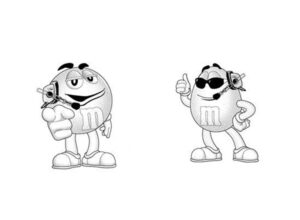
In the U.S., a provisional patent is a simplified patent application that reserves the right of its inventor to file a utility application for one year. In a sense, it protects an invention temporarily for one year, but is not itself a patent. A provisional patent is best viewed as a book mark or placeholder, usually filed only in emergencies or when an inventor is uncertain about investing in a full-blown utility patent. A provisional patent usually costs less than half of what a utility patent applications costs, and the filing fees are less than a fourth as much.
Under the Patent Cooperation Treaty (PCT), inventors can often obtain patent protection in foreign countries if a PCT application is filed with an international receiving office within one year of the first domestic patent filing.
The Patent Cooperation Treaty (PCT) is an international treaty between most of the countries in the world providing a unified procedure for filing patent applications to protect inventions in the signatory countries. A patent application filed under the PCT is called an international application or PCT patent application. A single filing of a PCT application is made with a Receiving Office (RO) in one language which progresses to a search by an International Searching Authority (ISA) and written opinion regarding the patentability of the invention, which is the subject of the application. A PCT application does not itself result in the grant of a patent, since there is no such thing as an “international patent”, and the grant of patent is a prerogative of each national or regional authority. A PCT application establishes a filing date and leads to a standard national or regional patent application, which may be granted or rejected according to applicable law, in each jurisdiction in which a patent is desired.
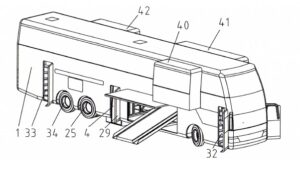
The World Intellectual Property Organization (WIPO) is an agency of the United Nations, created in 1967, “to promote the protection of intellectual property throughout the world.” WIPO is headquartered in Geneva, and administers to the 184 countries who have joined the international Patent Cooperation Treaty, including the United States. The Patent Cooperation Treaty provides a uniform method of filing patent applications on international stages, and of receiving patent protection in most of the countries of the world. Applications filed under the Patent Cooperation Treaty (PCT) are called international applications or PCT applications. We can file international applications for you. USPatentLaw may be able to help you obtain patent protection on inventions conceived and reduced to practice in any country in the International Patent Cooperation Union. Particularly if you have already filed for patent protection in your native country, we would be pleased to help you obtain protection in the U.S. Because there are strict time limits within which you must file protection (usually twelve (12) months from your first filing), it is important you contact us promptly if you are considering filing an application under the PCT.
Patent Figures
All patents usually require drawings (or figures). Drawings are necessary for utility patents, design patents, provisional patents and software patents. Our draftsmen and attorneys can help with the illustration and the drawings of your invention, whether it exists in CAD, photos, or just your memory. Note: A design patent protects only the appearance of the article and not structural or utilitarian features. The principal statutes (United States Code) governing design patents are: 35 U.S.C. 171, 35 U.S.C. 172, 35 U.S.C. 173, 35 U.S.C. 102, 35 U.S.C. 103, 35 U.S.C. 112, and 35 U.S.C. 132. Below are sample figures from patents we have prepared.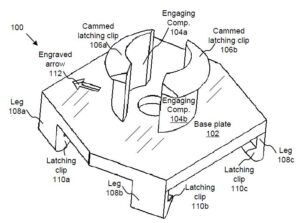
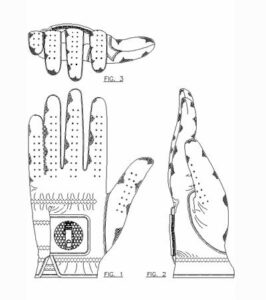
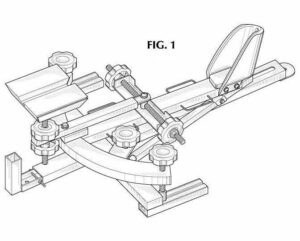
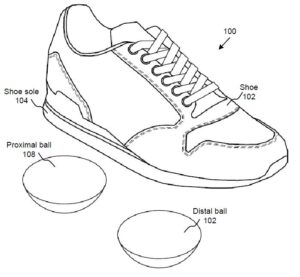
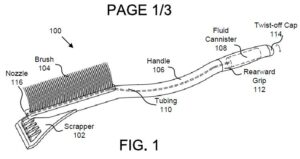
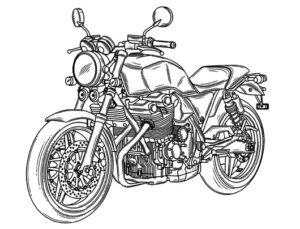
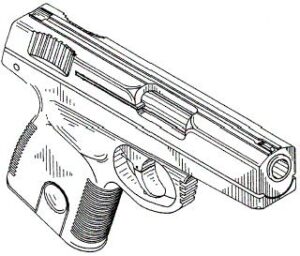
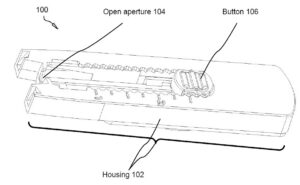
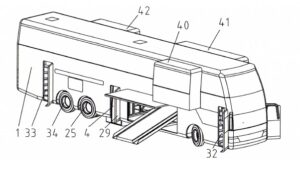
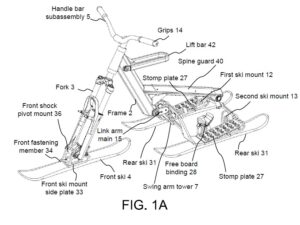
In some cases we may be able to write patentability opinions for inventions you have developed or are developing. Please call for rates. Patentability opinions do not come with patent searches and are separate opinions which are often more expensive because of liability considerations. The freedom to operate opinion is the legal opinion of a patent attorney that an individual or business is free to operate without infringing the patents of others.
Fees For Common Patent Matters:

Our Recently-Issued Patents
- Improvised Adjustable Guide Rod For Semiautomatic Pistols
- Doorframe Jig and Method
- Multi-Function Ukulele Chord Wheel
- Exercise Ring
- Handheld, Integrated Multifunction Shovel
- Motorhome with Onboard Touring Car, Elevator, and Crew Cabin
- Detachable Shoe Protector
- Computer Implemented Semantic Search Methodology, System and Computer Program Product for Determining Information Density in Text
- Apparatus, System and Method for Composite and Symmertrical Hybrid Electronic Connectors
- Compact Portable Auger Rack for Single-Operator Function
- Hydraulically-Actuated Horizontal Flush-Cut Radio Concrete Saw and Trip Hazard Removal Method
- Bi-Fuel and Dual-Fuel Automotive Combustible Gas Detection Apparatus and Method
- Golf Swing Training Apparatus
- Method, System and Computer Program Product for Management of Roping Contestant Entries
- Locking Electrical Socket
- Interchangeable Transmission Cradle Attachment for Lift Jack
- Tamper-Resistant Emergency Medication Reserve Repository
- Economic Means of Aspirating a Fuel Combustion Engine with Non-Atmospheric Gases to Produce a Subsequently Useful Byproduct
- Means of Processing Fuel Grade Petroleum Coke for Use in Internal Combustion Engines
- Convective Dissolution of Salts in Situ Ponds
- Means for Directing a Caller Through an Interactive Voice Response System and of Making Use of Prerecorded Precategorized Scripts
- Enterprise System and Computer Program Product for Inter-Connecting Multiple Parties in an Interactive Environment Exhibiting Virtual Picture Books
- Apparatus, System and Method for Stepper Motor Stall Detection
- Apparatus and Method for Securement of Two-Dimensional Bar Codes with Geometric Symbology
- Method for Producing Fungi for Use in an Ecosystem
- Adjustable Aircraft Maintenance Platform for Improving Efficiency and Safety of Aircraft Maintenance Operations
- Adjustable Auger Rack with Flighting Securement Facilitating Vertical Use, Storage and/or Transport of Auger or Drill Bit(s)
- Multi-Configurable Modular Decking System
- Motorcycle Passenger Bar
- Shackle and Method for Stabilizing a Vehicle During Transport
- Frameless Shower Implement Having Grooved Surfacing
- Golf Tee Measuring Apparatus and Divot Repair Tool• Ski Bike With Multiple Steering Components
- Multipurpose Eyewear with Adjustable Arms
- Resistance Trainer Having Multiple Interconnected Body Attachment Points
- Safe Holiday Light Assembly and Method for Safe Installation from the Ground
- Pneumatic Air Filter Cleaner
- Programmable Child Positioning and Tracking Device
- Data-Processing System and Method for Calibration of Vehicle Surround View
- Reinforced Joint Support Strap and Method of Application
- Position-Adjustable Self-Watering Apparatus for Controllably Dispensing Water Through Capillary Motion• Multipurpose Socket for Electrical Utility Repair Application
- Multipurpose Socket for Electrical Utility Repair Application
- Force Damping Dental Bridge Assembly with Synthetic Periodontal Ligament Fibers
- Method and System for Maintaining a Light Source at an Ideal Lux
- Method of Damping Lateral, Axial and Longitudinal Forces on Dental Prostheses
- Fragmenting Shotgun Projectile with Radially-Disposed Segments
- Forklift Grabber Mechanism for Securing Attachments to Forklift Forks
- Surgical Ligation Clip
- Modified Trigger Assembly and Method for Actuating a Repeated Shot
- Adjustable Universal Hardware Installation and Machining Jig for Carpentry Application
- Playless Hinge System with Releasable Hinge Pin
- Handheld Illuminating Device Orb-Shaped Lens for Enhancing Lateral Visibility

